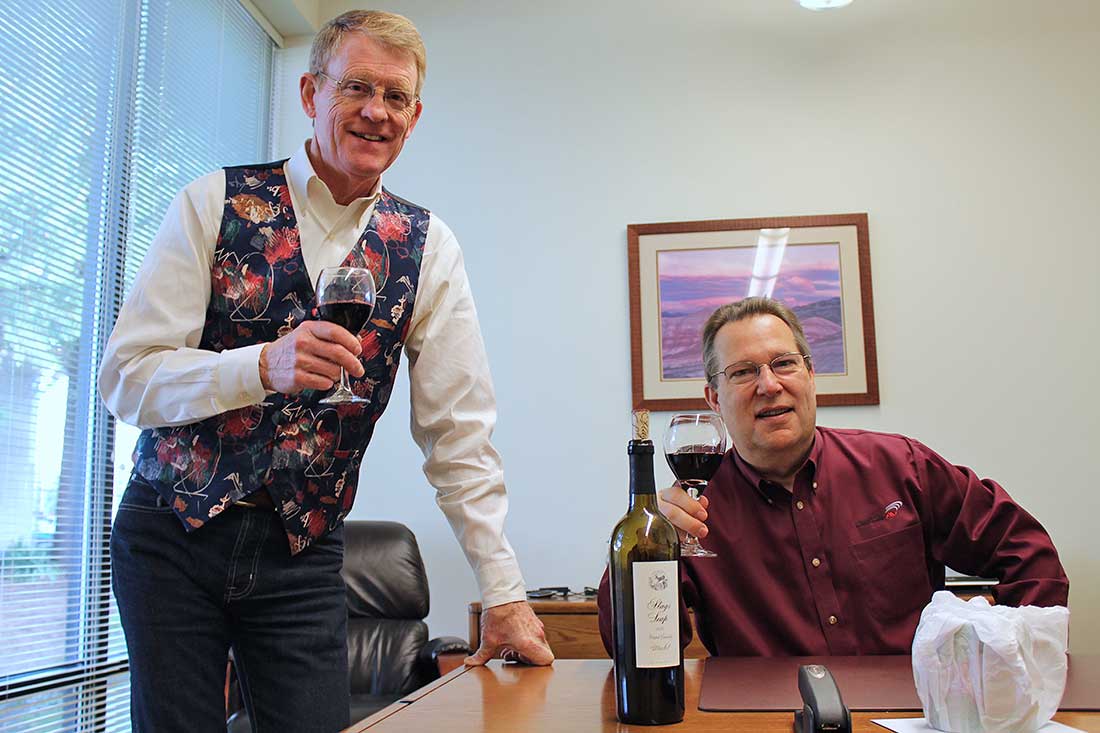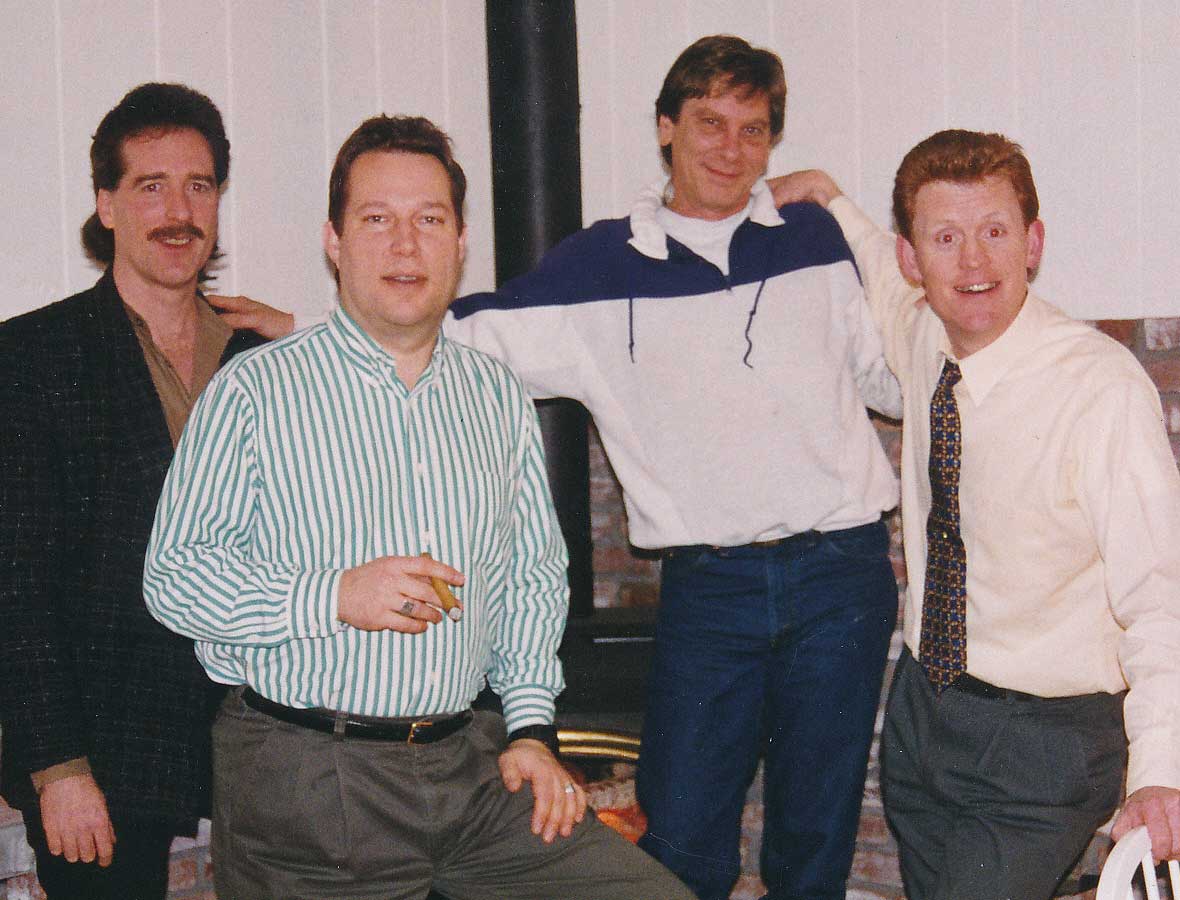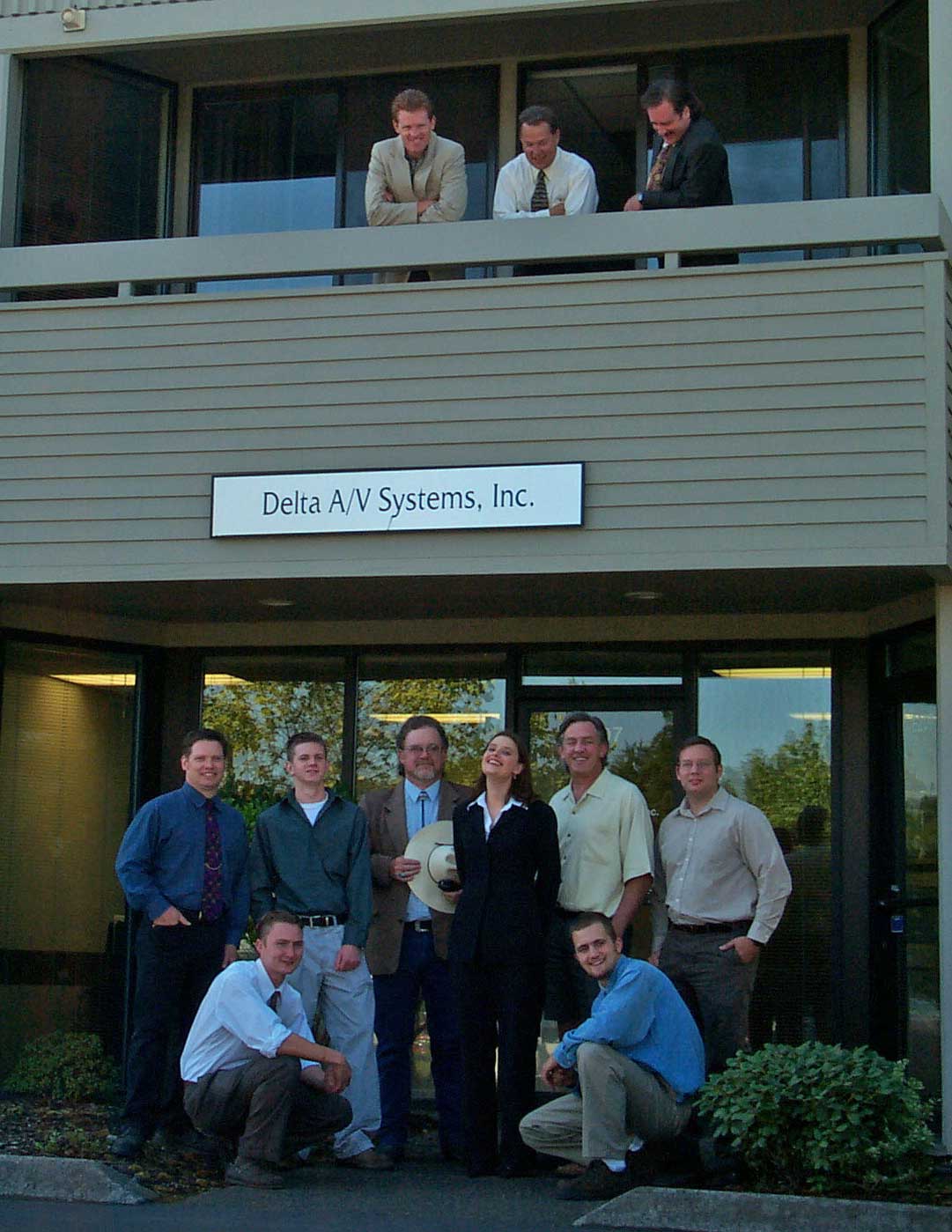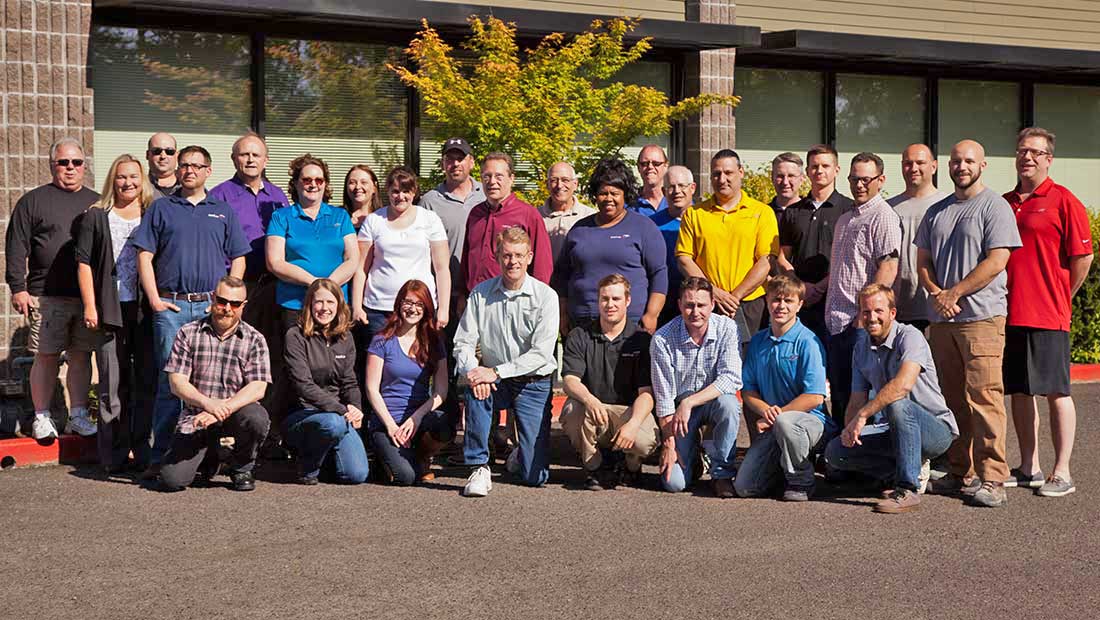
25th Anniversary Q+A: Mark and Bob
18 Jan 2021 | Posted in Uncategorized | Written By Whit Gurley
Watch a short highlight version of this interview
Brian Gotts of Serenity Studios sat down with Bob Southard and Mark Gottwig to discuss how things were different in the “old days,” what makes Delta strong and unique, and where the company is headed…
Getting Started in the AV Industry
Brian: What inspired you to pursue a career in the AV industry to begin with?
Bob: I came at it kind of organically. I’d been a professional musician, I started working in commercial music doing jingles, and I joined Mike Carter’s company. He was co-owner of Spectrum Studios, and I came down to the Portland area to work in sales and as their primary lyric writer. Then I got introduced to Mark and the studio, when they decided to design and build their own studio consoles. That was right before the big companies started really manufacturing high quality consoles. So with Mark and Spectrum, I started working on the console.
I was a solder jockey, working on the bench, and from there it started. Lindsey McGill, co-owner of Spectrum, was very involved in doing multi image shows for their clients. They would do all the sound for these multi image, multi projector extravaganzas, that would sometimes tour the country. Mark and I got involved, and we started from the ground up learning what it’s like to put together audio, video, just different images, making good sound. That’s how the first AV design company in Portland really started.
Brian: So really coming at it from a creativity angle. Would you say it was kind of creativity first, technology second? Where did the interests coming from music sort of fuse into AV work?
Bob: As for me, that’s remained a bit of a mystery. But, it is indisputable, because we have close to half of our employees, as musicians, and many of them very qualified musicians. I think to do what we do, it’s a marriage of art and science.
Brian: That’s a good way to put it.
Bob: And we’re the analog people in this digital world.
Brian: Yeah, that makes sense. What about the creation of Delta AV, what led up to that, and what caused you to decide to start your own venture?
 Mark: Well, it goes back a little bit, back to the Spectrum Group. The creativity has always been our clients, and we created opportunities for them to display their creativity. It was fun and it was technical. I had a contractor’s electrical license, and a low voltage license, so we started doing these installations into people’s offices, but they had the creativity. What we did, effectively, was to provide a place for them to display that material. There were a lot of issues, and the creativity was in the solution of those issues. That to this day, is our niche. And Bob mentioned it, that we provide the analog interface to a digital world.
Mark: Well, it goes back a little bit, back to the Spectrum Group. The creativity has always been our clients, and we created opportunities for them to display their creativity. It was fun and it was technical. I had a contractor’s electrical license, and a low voltage license, so we started doing these installations into people’s offices, but they had the creativity. What we did, effectively, was to provide a place for them to display that material. There were a lot of issues, and the creativity was in the solution of those issues. That to this day, is our niche. And Bob mentioned it, that we provide the analog interface to a digital world.
So, that has been our niche for a long time. Anywhere from creating projection systems, with the right size screens, with mirrors, the bounce, that electro acoustics that can put the audio over a huge system, that has always been the basics of what we do.
Starting Delta AV
Brian: Yeah, it sounds like you really filled a gap that was needed in the world, especially at the time that you started the company. At what point in time did you realize, “Hey, we’ve got something here.”?
Mark: Lindsay and I installed a visitor center at Bonneville Dam, and we were working real late one night, trying to get this thing going. And on the way back, we were starving, we stopped in this restaurant, and we were sitting there, and we said, “This was fun. This was actually fun.” We enjoyed doing it. It was hard work, it was creative work, and we made good money at it. And we just decided, “Let’s go for this. Let’s try and make a business of it.”
 That was at Spectrum, and I was with Spectrum for 12 years. I won’t get into details about it, but basically I was fired. I put together MRG Consulting out of my basement, while Bob stayed with Spectrum. Then one of my clients, Sherman Aldridge, asked me to help him develop the sound system replacement for the Multnomah Dog Track and as a consultant, and helped them install it, and they made good money. Shortly after, we put together a company called En Touch Systems and Bob left Spectrum and came to work with us, and there was the team right there. We worked with Sherman for about two, three years, and during that time the three of us did some pretty amazing things.
That was at Spectrum, and I was with Spectrum for 12 years. I won’t get into details about it, but basically I was fired. I put together MRG Consulting out of my basement, while Bob stayed with Spectrum. Then one of my clients, Sherman Aldridge, asked me to help him develop the sound system replacement for the Multnomah Dog Track and as a consultant, and helped them install it, and they made good money. Shortly after, we put together a company called En Touch Systems and Bob left Spectrum and came to work with us, and there was the team right there. We worked with Sherman for about two, three years, and during that time the three of us did some pretty amazing things.
And then one day, Sherman came to Bob and I and said, “Well, I’m just not interested anymore. You want to buy the company? Because I’m not going to do it anymore.”
We said, “Sure.” So, we started going into negotiations and to make a long story short, we ended up paying him a percentage of the profits on the contracts that we had and we went back to work as Delta AV systems in the same position, in the same desk, and the same cubicles, in the same office.
In that first year, Bob, Steve, and I would make the sale, do the engineering, programming, installation, billing, all the taxes, everything. We soon got tired of that and we hired our first employee, Jennifer, in 1997.
Growing the Team
Brian: What were some of the biggest challenges or milestones that you had to overcome as you built the company? What sticks out to you as moments that really tested you, and that you were able to navigate?
Mark: I think the key to our success is finding people who love the business, that love the work that they do, and the talent that they bring to it. I think the biggest transition was when Bob and I stopped working in the company, and started working on the company. I think that was in about 2008, and we have made it a point to replace ourselves with people who were better at it than we were. And right now, we have an entire company, where Bob and I have done just about every job in that company. But, now we have people that do it better than we did, and that right there is the success of Delta AV.
Brian: Absolutely, it’s the people. I’m curious, how did you go about finding these people? Especially the ones that have been there as long as they’ve been. Was it luck?
 Bob: This is the magic that I see in our company, because we did not seek people with the exception of one person. The majority of our talent has sought us out, because they had this burning desire to do better, and they were involved with other companies who couldn’t get it right. Who didn’t seem to care if they got it right, they just wanted to know that the check cleared. They sought us out, because they heard that we were passionate about sound, and that we were passionate about good visual, and that we knew physics, we respected both the art and the craft.
Bob: This is the magic that I see in our company, because we did not seek people with the exception of one person. The majority of our talent has sought us out, because they had this burning desire to do better, and they were involved with other companies who couldn’t get it right. Who didn’t seem to care if they got it right, they just wanted to know that the check cleared. They sought us out, because they heard that we were passionate about sound, and that we were passionate about good visual, and that we knew physics, we respected both the art and the craft.
Brian: It sounds like the reputation kind of preceded you, as a place to go if you’re really passionate, and eager to learn. And it sounds like you were able to give people opportunities to do things beyond maybe what they were originally hired for.
Bob: That’s also been a really positive part of our company, is to be so involved as a legitimate audio visual training facility, for people in the industry. When they work with us, we like to think they’re going to learn the business.
Brian: I’ve often heard of the AV industry referred to as kind of like a cottage industry, it’s really an interesting niche. Do you see it as more of a benefit, or a challenge throughout the 25 years, as you were building the company?
Mark: I think that that’s the only reason we’re in business today. And the audiovisual industry is so specialized with talents that the digital world doesn’t have. That’s why we’re still here. We still solve those issues. I think being a small company, concentrated in Gresham, in one location, being fairly efficient and concentrating on AV rather than just corporate growth, has been very beneficial to us.
The Importance of People in This Business
Brian: In 25 years of running and building Delta AV, does anything stand out to you as a valuable lesson, something you feel that you really learned, either about life or business?
Bob: When I do a personal review of what it’s been like to do my part running this company, I’ve always recognized the blessings of our employees. I was always out there with crews, for years, and years. And because I was out there with them, I never forgot the importance of supporting the people that are out there getting it done every day.
I think that’s remained a centering place for me, that we look at our people as a team. When we treat everyone as a valued part of the team, we can allow them to be more of what they can be. One of the things that we’ve learned in business is, you have to work diligently to provide competent job descriptions. And yet, one of the challenges of having a company of very creative people, is that we also don’t want to put tight guardrails around those positions, to stifle future talent.
When I look at how many of our employees came in the door in one position, and eventually ended up in an entirely different, and much more, I would think in terms of them being able to use all their talents. To me, one of the most gratifying things, is that we’ve never allowed a job description to stand in the way of somebody growing past that, into something that continued to stimulate them.
Brian: That’s great. Collaboration, and creating opportunities for people to really thrive, and perhaps unlock more of their talents at Delta AV. I think that’s really special.
Mark: I did want to mention one other one, that was an epiphany for me. I discovered that no matter what your morning was like, or the day before, the way you walked in the front door and greeted the receptionist made the whole mood of the company. I started making this a point and I couldn’t believe the difference that made in the entire day. Not just for me, but the feeling that you got in the company.
And the other one was, I tried to make a point quite frequently, of visiting what I call the four corners. Where I would just get up out of my office and if I found somebody that wasn’t too busy I would just sit down and talk for a couple of minutes. And I found out so much about how people feel, and what’s going on in that company, that I kept that up the entire time. That was one of the more beneficial things that I ever did.
Brian: That’s really a great story, Mark. It’s just this theme of supporting people and the incredible talent and culture that you’ve been able to foster, and cultivate at Delta AV over all these years.
Mark: These are good people, with balanced families, balanced lives. People that are musicians, that are poets, that are painters. I couldn’t believe the art, the talent that came out of the woodwork. We thought we had a lot of musicians, and here we have an incredible number of artists.
That really changed the morale. That kind of stuff is very important. We’ve always tried to hold concerts and picnics in the summertime, and play music. But that was only dealing with one aspect of the creativity of Delta. Opening this art show wasn’t something that we thought of, this is something that they came to us and said, “This is what we’d like to do.”
Brian: I think there’s a lot that you guys have created at Delta AV, in terms of your approach to people, that is really needed in the business world, to have more attunement to people, and to be more supportive of their growth, and their creativity.
Legacy of Delta AV
Brian: 25 years is a huge milestone. What kind of legacy do you want to leave with Delta AV, in the next 25 years?
Bob: I still maintain that it’s a people game out there, and our industry is still dealing with people dealing with people. If we continue to stimulate our people to be forward thinkers, to embrace the new technologies, and bring them into the workplace in a way that speaks well to other people, we’re always going to have a job. The heritage of Delta AV will be preserved, because we’re doing this to make good communication happen. And I think we’ve got great people to make that happen.
Mark: We want to be in a position to solve their issues. As long as we can be a resource, to use the technology to solve these issues, and not be in a position to push this new technology on them, to get them to use it, whether they need it or not. Which is the way it used to be done years ago. We’ve never done it that way.
Brian: Right, always focused on problem solving, and not just the sales.
Mark: Yes, being a trusted confidant that will go in there and listen to them and what their challenges are, and then using our resources to solve it. Helping them grow and maintain their growth, in that communication, throughout our relationship. And that spans more than just the physical aspect of AV. Bob is absolutely 100% right. It’s a people person business, helping them solve their issues. And if they trust you, they’ll come back to you.
Bob: One of the most gratifying things, I think, for Mark and myself, is when we look at our client list, and we realize that the majority of the customers that we had even before we started Delta AV, we still have today, 25 years later.
Brian: Wow. That’s pretty incredible. What do you attribute that to?
Bob: Being real, being authentic. Having people involved who are willing to take it on the chin. If we get something wrong, I’ve always told my guys, and Mark’s said it too, “We’ll eat every dime from this job to make it right. It’s just got to be right.
Mark: We always, always make it right, and make sure that they’re happy.
Brian: What a great legacy to leave as well, that of integrity. Integrity in business is so important, and you both have clearly ran Delta AV in that way. Reflecting on 25 years. If there’s anything else that I didn’t ask you, that you want to share?
Mark: I have loved this business. All aspects of it. Including learning about the business. And if there’s anything that I’ve missed, now that I’m retired, it’s the people. Seeing the people. Of course, in a pandemic, we’re all missing that anyway. But, seeing the people, showing up at the office. Mixing with people that are having a great time doing what they’re doing. It’s a wonderful atmosphere, I miss that a lot.
Bob: I would say that one of the thrilling aspects of being an owner is to hire people, and watch them come in unmarried, and then they get married, and then they have children, and then they buy a house, and then they buy a second house. They move up into a larger place, and their kids grow up, and they go to school.
Mark: And then they have 11 of them! (laughing)
Brian: (Laughing) Is that all?
Bob: I mean, it’s thrilling. It is thrilling to me, to be a part of something where people have been able to be so valuable to our company, and for our company, to obviously become very valuable to them. It’s humbling.